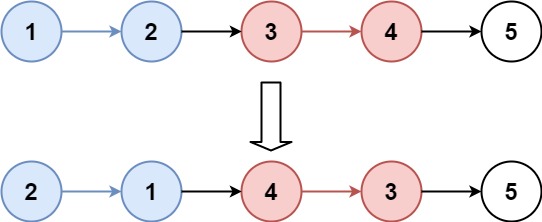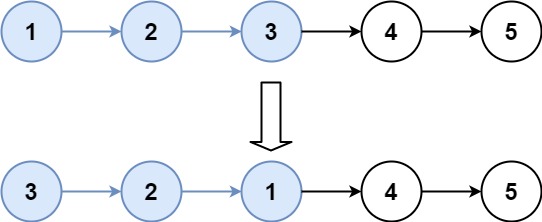Hard
Given the head of a linked list, reverse the nodes of the list k at a time, and return the modified list.
k is a positive integer and is less than or equal to the length of the linked list. If the number of nodes is not a multiple of k then left-out nodes, in the end, should remain as it is.
You may not alter the values in the list's nodes, only nodes themselves may be changed.
Example 1:

Input: head = [1,2,3,4,5], k = 2 Output: [2,1,4,3,5]
Example 2:

Input: head = [1,2,3,4,5], k = 3 Output: [3,2,1,4,5]
Constraints:
- The number of nodes in the list is
n. 1 <= k <= n <= 50000 <= Node.val <= 1000
Follow-up: Can you solve the problem in O(1) extra memory space?
# Definition for singly-linked list.
# class ListNode:
# def __init__(self, val=0, next=None):
# self.val = val
# self.next = next
class Solution:
def reverse(self, head, left, right):
prev = None
current = head
while left <= right:
temp = current.next
current.next = prev
prev = current
current = temp
left+=1
return prev, head, current
def reverseKGroup(self, head: Optional[ListNode], k: int) -> Optional[ListNode]:
if k == 1 or not head:
return head
s_head = ListNode(0, head)
current = s_head
left, right = 1, 0
while current.next:
node = current
for j in range(k):
node = node.next
if not node:
break
right += 1
if right % k == 0:
new_head, new_tail, tail_next = self.reverse(current.next, left, right)
current.next = new_head
new_tail.next = tail_next
current = new_tail
left+=k
else:
break
return s_head.next